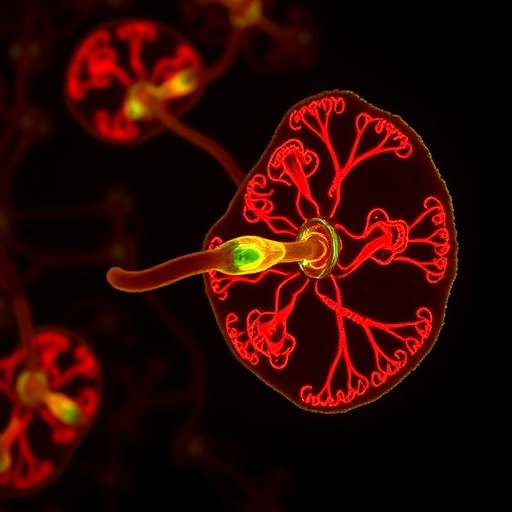In a groundbreaking study, researchers Hu, Tong, and Tian et al. have investigated the role of N6-methyladenosine (m6A) modification in regulating the EphA10 gene in prostate cancer. This modification is a critical epigenetic mechanism that influences RNA stability, splicing, and translation. In particular, the new findings suggest that the m6A modification of EphA10 plays a significant role in facilitating prostate cancer progression through the activation of key signaling pathways, namely ERK and AKT. These discoveries open new avenues for potential therapeutic strategies in combating prostate cancer, a leading cause of cancer-related morbidity and mortality worldwide.
As researchers delved deeper into the molecular underpinnings of prostate cancer, they focused on EphA10, a member of the Ephrin receptor family known for its involvement in various cellular processes, including cell proliferation, differentiation, and migration. The study presented a novel insight that the m6A modification of EphA10 could enhance its stability and expression, subsequently driving cancer cell proliferation. The implications of these findings extend not only to the biology of prostate cancer but also to the potential development of targeted therapies aimed at modulating EphA10 activity.
In evaluating the ERK/AKT signaling pathways, which are crucial for cell survival and proliferation, the researchers found that increased EphA10 expression correlates with enhanced activity in both pathways. This concurrent activation leads to a greater proliferative capacity of prostate cancer cells, affirming the hypothesis that m6A modifications serve as a crucial regulatory mechanism in oncogenesis. Activation of these pathways by EphA10 highlights a vital interplay where m6A modification not only serves to modulate gene expression but also influences critical signaling cascades that dictate cancer cell fate.
The study employed comprehensive RNA sequencing and quantitative PCR analyses to demonstrate the significant upregulation of EphA10 in prostate cancer tissues compared to adjacent non-tumor tissues. This critical observation provides compelling evidence that EphA10 is a potential biomarker for prostate cancer progression. The highlighted upregulation in human samples emphasizes the relevance of the study’s findings in a clinical context, suggesting that measuring EphA10 levels could aid in diagnosing and monitoring the progression of prostate cancer.
Furthermore, the researchers utilized both in vitro and in vivo models to substantiate their claims regarding the m6A modulation of EphA10. By using CRISPR/Cas9 technology to delete the METTL3 enzyme responsible for adding m6A modifications, they were able to observe a marked decrease in EphA10 levels, reinforcing the idea that m6A modification is critical for the expression of this gene. This experimental design showcases the power of genetic engineering in elucidating the functional roles of specific epitranscriptomic modifications in cancer biology.
The study also sheds light on the potential for m6A methylation as a target for therapeutic intervention. By developing small molecules or biologics that inhibit the m6A methylation process or disrupt the interaction between EphA10 and the associated signaling pathways, researchers could pave the way for novel treatments that specifically incapacitate malignant prostate cells. This approach would be particularly beneficial in cases where traditional therapies, such as hormone therapy or chemotherapy, have failed or resulted in acquired resistance.
As the implications of this research unfold, it becomes increasingly clear that understanding the nuances of RNA modifications such as m6A will be pivotal in crafting the next generation of cancer therapies. Researchers are now poised to build upon the findings of Hu and colleagues, exploring additional RNA modifiers that may also influence prostate cancer dynamics. This ongoing exploration of the epitranscriptome represents a promising frontier in cancer research and therapy.
Moreover, the study reinforces the importance of interdisciplinary collaboration in advancing our knowledge of cancer biology. Integrating insights from molecular biology, genomics, and clinical research can lead to the establishment of new paradigms in treatment strategies. As researchers worldwide exchange ideas and methodologies, the collective effort aims to ultimately improve patient outcomes and quality of life for those affected by prostate cancer.
This research does not only offer a glimpse into the molecular mechanisms underlying prostate cancer but also represents a significant step forward in our understanding of cancer biology as a whole. As techniques like RNA sequencing evolve, they enable more refined investigations into the roles of various RNA modifications. Consequently, future studies may uncover further pivotal players in the battle against cancer.
The findings of Hu et al. reaffirm the critical role of the epitranscriptome in cancer progression, highlighting the need for ongoing inquiry into how these molecular modifications can be harnessed for therapeutic benefit. As scientists uncover the complexities of m6A and its impact on gene expression, they are reminded that innovation and collaboration are core tenets of scientific progress.
In conclusion, the research conducted by Hu, Tong, Tian, and colleagues presents a novel and compelling narrative regarding the role of N6-methyladenosine modification of EphA10 in prostate cancer progression. As scientists investigate the potential of targeting these pathways, the hope remains that such insights will usher in a new era of therapeutic options that better address cancer’s relentless challenge. The future of prostate cancer treatment may very well hinge on our ability to decode the intricate language written in the RNA of tumor cells.
Subject of Research: Epitranscriptomic regulation of EphA10 in prostate cancer progression.
Article Title: The N6-methyladenosine Modified EphA10 Promotes Prostate Cancer Progression by Activating the ERK/AKT Pathway.
Article References:
Hu, L., Tong, J., Tian, D. et al. The N6-methyladenosine Modified EphA10 Promotes Prostate Cancer Progression by Activating the ERK/AKT Pathway.
Biochem Genet (2025). https://doi.org/10.1007/s10528-025-11299-6
Image Credits: AI Generated
DOI: https://doi.org/10.1007/s10528-025-11299-6
Keywords: N6-methyladenosine, EphA10, prostate cancer, ERK/AKT pathway, epitranscriptome, cancer progression.
Tags: AKT pathway activation in prostate cancercancer-related morbidity and mortality.cellular processes in cancer developmentEphA10 gene regulation in prostate cancerERK signaling pathway in cancerm6A epigenetic modification in cancermolecular mechanisms of prostate cancerprostate cancer progression mechanismsRNA stability and translation in cancerrole of Ephrin receptors in tumor biologytargeted therapies for prostate cancertherapeutic strategies for cancer modulation





